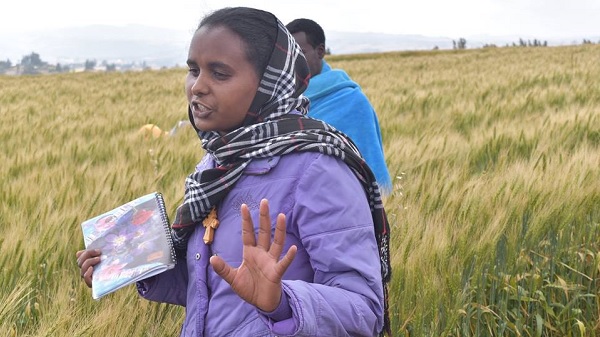
Sasakawa Global 2000 Ethiopia (SG 2000 Ethiopia) held a three-day field days in different localities of Benishangul Gumuz and Oromia regional states, in the presence of reporters and their crew representing the country’s major electronic and print media, as well as high ranking federal, regional, and zonal officials.
The visiting media witnessed firsthand SG 2000 Ethiopia’s interventions and interacted with beneficiary communities. The visiting officials equally hailed Sasakawa`s activities as “model to other development partners.”
SG 2000 intervention areas visited among others included Technology Option Plots (TOPs), Women Assisted Demonstrations (WADs), Production Test Plots (PTPs), Community Based Seed Multiplication projects (CBSM) & Capacity development; Metal silo storages and Purdue Improved Crop Storage (PICS) bags, shellers, Village Saving and Loan Associations (VSLAs), and Commodity Associations (CAs).
During the farmers’ day in Begi Woreda Western Wolega zone of Oromia region, zonal administrator Chali Begna lauded SG 2000 Ethiopia`s activities describing the organization as “a longstanding partner and a household name in smallholder farmers` communities of the zone and the region at large.”
The visiting media seized the occasion to meet various beneficiaries under SG 2000 Ethiopia’s different interventions and approaches.
Farmer Bashir Lemma is one of the beneficiaries in Lalonora Kebele of Begi Woreda in Western Wolega Zone. A father of seven, Bashir told the visiting journalists: “Since I began using farming technologies that Sasakawa has introduced and helped us learn and apply, I have relished quite a lot in my life, and my family too. One instance is that a year after adopting improved seeds and line sowing method, we began harvesting high yield.” According to Bashir, he quit his education at grade eight 23 years ago. He went on to say: “Fortunately, Sasakawa bringing us home the technologies in collaboration with the local extension workers, it has made life easier for me. Hence, I resumed my education as seventh grader in 2013 and I am now attending grade ten with my children to sit for the national exam. Furthermore, I have built a house. In short, implementing the technologies has transformed my life.”
Misgana Mejor also lives in Lalonora Kebele. She chairs a group consisting of 30 female members, called “Women Assisted Demonstration (WAD)”. She said: “It is a program that target and benefit women. Sasakawa has brought this program to us and involved the women in our Kebele to maximize our benefits. Soon the organization came, it conducted a series of meetings with us and getting on board our husbands to create awareness among us and the community that women could own their own plots of land on which they can carry out the WAD program. When our husbands were convinced about the merits of the program, they allowed us to use certain plots of land on our own. Then the agricultural workers in our Kebele along with the SG 2000 staff repeatedly came in support providing us with such proper technologies as line sowing, using compost, select seeds, and the likes. Implementing the technologies according to their advice and the guidance of development workers, we have become beneficiaries. Our production has increased to 16 or 17 quintals (3530 or 3740 pounds) from two or three on the same plot of land because of the technologies.”
Likewise, in Amba Kebele of Bambasi Woreda, Benishangul Gumuz regional state, women have benefited from the WAD program. Marema Begna is one beneficiary who participated in this scheme. She told the visiting media: “We, women in our neighborhood have improved our lives using technologies in accordance with the advice of the extension experts. I am able to send all my children to school; I built a better home last year. This year, since my maize farm is giving by far a better yield, I am expecting to sell my produce for more than 50,000 birr (more than 2000 USD)”.
Beghi Woreda administrator Tekalign Yimamu, said that implementing the right technologies have enabled the local farmers collect high yield. He asserted that “at household level, farmers have become self-reliant in food. Their lives have significantly improved over the last three-four years. They are able to send their children to school. Even some are constructing new homes in town. Above all, our farmers are benefiting from the technology and knowledge transfer. We, the administration here and the community, owe SG 2000 Ethiopia a debt of gratitude.”
Source: SAA News
——
Other stories:
- VIDEO: Working Together to Grow a Green Economy – Ethiopia
- Ethiopian Farmers to Benefit from 20 US-Funded Service Centers
- EMDIDI: Ethiopia Set to Raise Meat, Meat Product Export Revenue
- Ethiopia’s Ministry of Industry to Construct 17 Agro-Industrial Parks Nationwide
- GGGI: Enhanced Water Management Policies Needed to Sustain Ethiopian Growth
